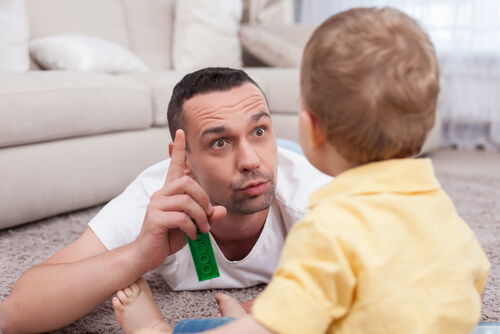How To Curb Bad Language in Children
Jan 15, 2022 Question: I'm talking about using better/nicer words but it has still remained in their vocabulary. How can I work on this language before they start school?
I’ll never forget the first time we heard our daughter swear. We were on our way home from The Bronx Zoo with my sister-in-law and mother-in-law. Our daughter, Nora, was a little over two years old and was pretty quiet for the majority of the car ride. We let the zoo right in time for rush hour traffic and my husband had to suddenly slam on the brakes. We heard this tiny voice from the backseat say, “oh shit.” We looked at each other and I remember saying, “did she just say that?” We let it go so as not to give a reaction, but a little while later, my husband had to slam on his brakes again and she said the same thing. We immediately scolded her for the word usage and explained why she shouldn’t say that word.
My husband and I are very cognizant of what we say in front of our children, especially since the time that they could repeat information. We kept thinking of where and when she heard the word, “shit.” One of her favorite movies is “Ghostbusters.” We have no idea why, but she LOVES IT. At the end of the movie, one of the Ghostbusters says, “Oh shit.” We figured out that’s where she learned the word.

I will tell you that it took her saying the word probably a few more times before she finally understood that she shouldn’t be saying it. We remained consistent in our reactions and did some of the things that I’m going to mention below. Now, she’s 3 and will tell people, “that’s a bad word; don’t say it.”
Why Does it Happen?
I know it can be quite a shock when you hear your toddler swear for the first time. Sometimes, they do it because they are just exploring language. They don’t know what the word means so they are looking for your reaction and explanation so that they can learn.
Another reason children swear is because of your reaction. We know that children keep doing actions when they get a big reaction. They draw us a picture, we react positively, they do it again. We tell them not to do something, so they push their limits to see how far they can get. The same holds true to swearing. Depending on how you react, will dictate how your child responds.
Boost Your Child’s Speech Development!
Improve language & communication skills with fun learning!

What to do When it Happens?
One of the biggest pieces of advice I can give you is to stay calm. Young children often swear because they’re exploring language. They might be testing a new word, perhaps to understand its meaning. Sometimes swearing happens accidentally when children are learning to say words. Children might also be trying to express a feeling like frustration. Or they might simply be saying the word because it sounds funny or gets a reaction. Children might also be imitating others when they swear.
One of the most effective ways to deal with cursing is to ignore it completely. Most of the time, cursing is attention seeking, so if we remove our reaction, children will realize they aren’t getting any feedback and will stop cursing.
Generally, toddlers and preschoolers don’t need explanations of swear words. They’re too young to understand some of the concepts behind the more common swear words. It’s enough just to say, ‘That’s not a nice word’. Children over the age of four years can get some good out of a simple explanation.
If you think your child might have some understanding of the meaning of the word, you can ask him what he thinks the word means. Then use general terms to explain why it’s not OK. For example, you could say, ‘That’s a word for poo, and it’s not nice to use’.

If your child keeps cursing, you may need to look at long term options. Talk to every adult in your home and agree on acceptable words and phrases to use. For example, in some families, expressions like ‘Oh my god’ are OK, but other words aren’t. We discourage our daughter from saying, “oh crap,” but that might be alright with some families.
Create rules! If your family has rules about swearing, it’ll be easier to point out when your child is using unacceptable language. For example, you might say, ‘Please use a nicer word’, or ‘We don’t use words like that’. It’s less confusing for children if the rules about swearing apply to adults as well as children. If you want your children to avoid swearing, you and the other adults in your home need to avoid it too.
Here are more ideas to encourage respectful speaking and reduce swearing in your family:
- Think of other words to use if you find it hard to stop swearing, and other ways to handle difficult situations. For example, instead of swearing, you could say something like, ‘I feel really frustrated or angry’. This way you’re modelling better ways of expressing feelings.
- Praise your child when you notice her dealing appropriately with anger or frustration. For example, if your child tells you that a playmate was using swear words to tease her, praise your child for walking away from the situation and not using those words herself.
- Be aware of what your child watches, listens to and plays with. That means supervising and checking the ratings on TV, movies and other multimedia and music. It’s also a good idea to have the TV and computers and other devices in a part of the house where you can easily see them.
